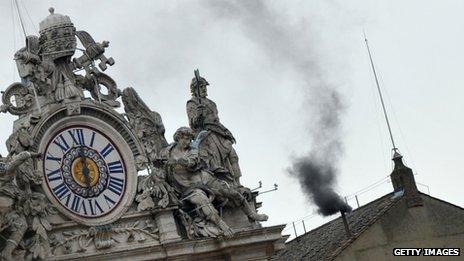Rome conclave: Cardinals voting again on new pope
- Published

Catholic cardinals meeting at the Vatican have been holding another round of voting to choose a new Pope.
The session in the Sistine Chapel follows two inconclusive rounds on Wednesday morning, and there is no sign of a positive result so far.
Cardinals are meeting for a second day to choose a successor to Pope Benedict, who resigned last month.
The 115 electors are to remain isolated until two-thirds agree a leader for the world's 1.2 billion Catholics.
The cardinals will vote four times daily until a single candidate garners a two-thirds majority.
A successful vote would immediately be followed by white smoke from a chimney on the roof and, soon afterwards, the Latin announcement "Habemus Papam" - we have a Pope.
Black smoke indicates no pope has yet been chosen.
Before the conclave began there was no clear frontrunner to replace Benedict XVI.
The 85-year-old stepped down last month, saying he was no longer strong enough to lead the Church, which is beset by problems ranging from a worldwide scandal over child sex abuse to allegations of corruption at the Vatican Bank.
'Perfectly normal'
Voting takes place in silence, with no formal debate, until a decision is reached. If that does not happen after three days, there may be a pause for prayer and informal discussion for a maximum of one day.
Crowds waiting for a result once again braved rainy conditions in St Peter's Square to watch out for smoke issuing from the chimney.
Vatican spokesman Federico Lombardi said it was "perfectly normal" for there to be no result at this stage of the conclave, and not a sign of division among the cardinals.
"One should not interpret this as being division or divisiveness amongst the cardinals, take into consideration the size of the group and the normal process," he said.
Two US students who were in St Peter's Square described seeing the black smoke
Only one pontiff in the last 100 years, wartime Pope Pius XII, had been elected after just three rounds of voting, he added.
He said he had been "surprised" by the number of people who turned out in St Peter's Square to watch the first smoke on Tuesday night, and said the crowds would surely grow as suspense mounted.
"We are living a beautiful and intense moment," Fr Lombardi said.
He added that Benedict - now Pope emeritus - was "doing well" and following the ceremony "with great interest".
Fr Lombardi also defended a number of cardinals, amid calls that they be excluded from the conclave because of their alleged role in covering up child sex abuse cases by priests.
He accused the campaign group Survivors' Network of those Abused by Priests (Snap) of "negative prejudices" for saying that US Cardinal Roger Mahony and others were unfit to take part.
"We are convinced there are excellent reasons for why these cardinals should be respected and have every right to be in the conclave," he added, saying that they had "given their explanations".
On Tuesday, Cardinal Mahony's former Archdiocese of Los Angeles agreed to pay out nearly $10m (£6.7m) to settle four cases of sexual abuse by a former priest, Father Michael Baker.
Unusual outcome?
The secrecy of the conclave means we have no idea who has done well or badly in the early rounds of voting, the BBC's James Robbins in Rome says.
But there could come a point after several days when the cardinals share a fear that indecision could be interpreted by the outside world as evidence of profound division, he adds.
In 2005 it took four votes for Cardinal Joseph Ratzinger - the future Benedict XVI - to be elected Pope.
But he was a clear favourite before the conclave began, and the long illness of his predecessor, John Paul II, meant cardinals had plenty of time to prepare and consider who they wanted to lead the Church.
This time, speculation has focused on three contenders: Angelo Scola of Italy, Brazilian Odilo Scherer and Marc Ouellet of Canada.
But some analysts argue that Benedict's surprise abdication - the first by a Pope in six centuries - could be followed by an equally unusual outcome, with an outsider emerging as a compromise candidate.